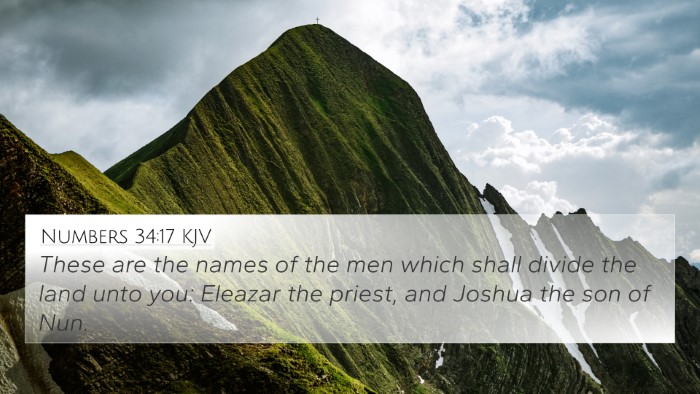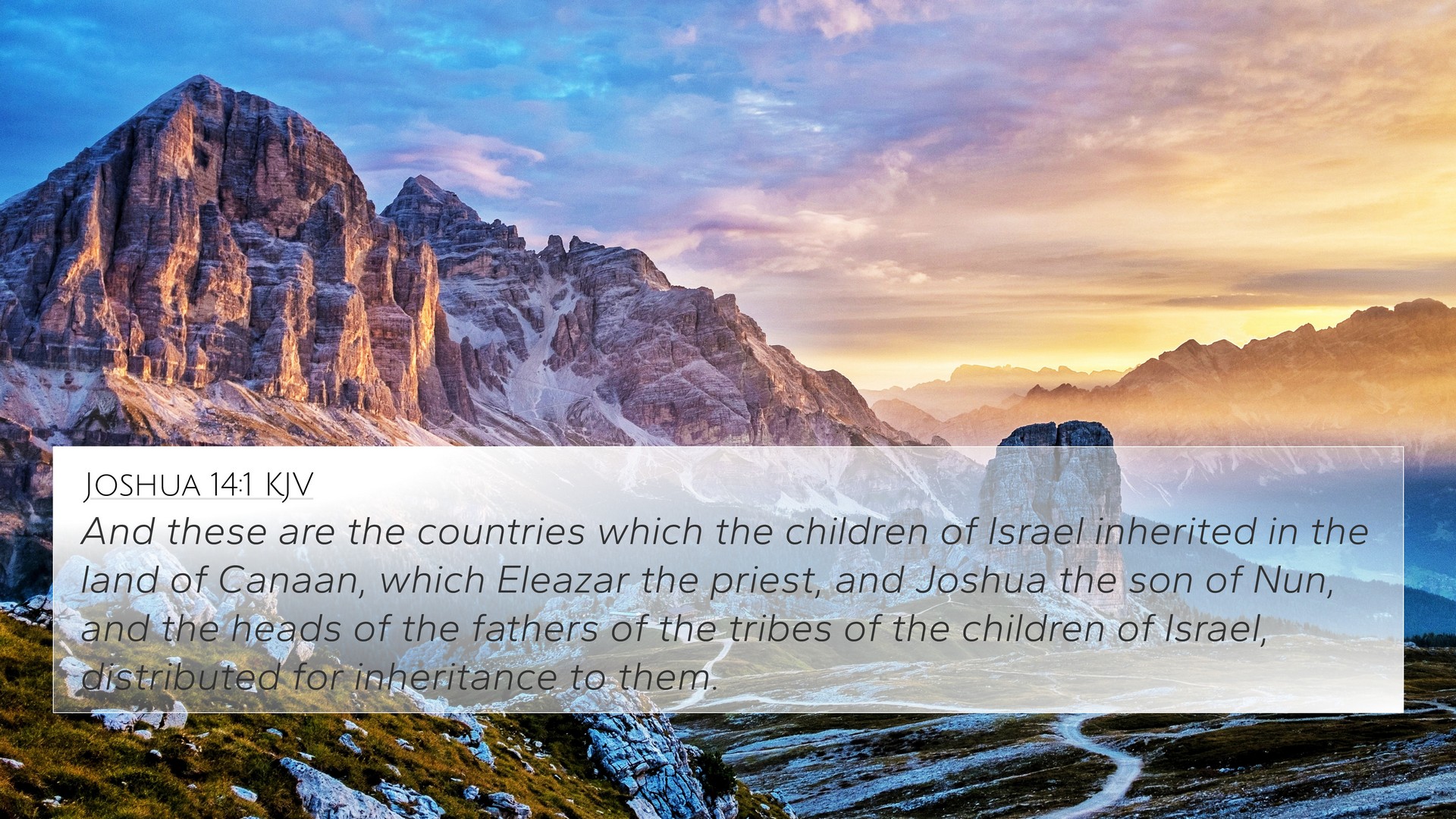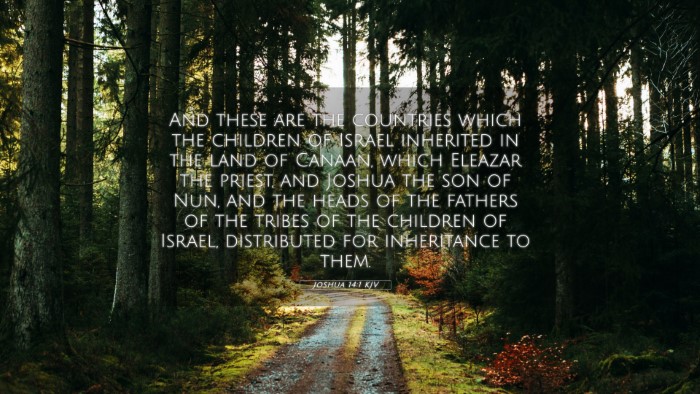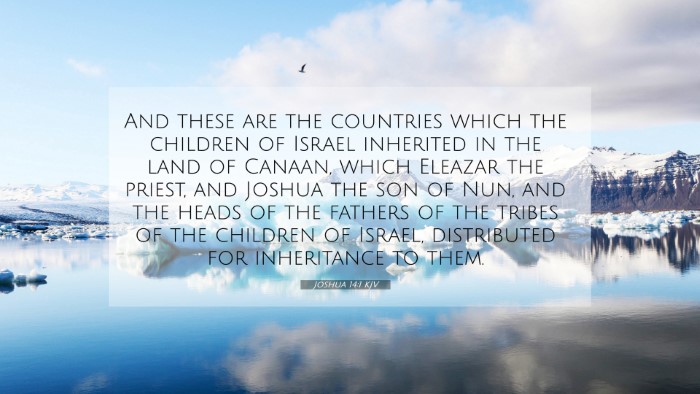Old Testament
Genesis Exodus Leviticus Numbers Deuteronomy Joshua Judges Ruth 1 Samuel 2 Samuel 1 Kings 2 Kings 1 Chronicles 2 Chronicles Ezra Nehemiah Esther Job Psalms Proverbs Ecclesiastes Song of Solomon Isaiah Jeremiah Lamentations Ezekiel Daniel Hosea Joel Amos Obadiah Jonah Micah Nahum Habakkuk Zephaniah Haggai Zechariah MalachiJoshua 14:1 Similar Verses
Joshua 14:1 Cross References
And these are the countries which the children of Israel inherited in the land of Canaan, which Eleazar the priest, and Joshua the son of Nun, and the heads of the fathers of the tribes of the children of Israel, distributed for inheritance to them.
Uncover the Rich Themes and Topics of This Bible Verse
Listed below are the Bible themes associated with Joshua 14:1. We invite you to explore each theme to gain deeper insights into the Scriptures.
Joshua 14:1 Cross Reference Verses
This section features a detailed cross-reference designed to enrich your understanding of the Scriptures. Below, you will find carefully selected verses that echo the themes and teachings related to Joshua 14:1 KJV. Click on any image to explore detailed analyses of related Bible verses and uncover deeper theological insights.

Numbers 34:17 (KJV) »
These are the names of the men which shall divide the land unto you: Eleazar the priest, and Joshua the son of Nun.
Joshua 14:1 Verse Analysis and Similar Verses
Understanding Joshua 14:1
Joshua 14:1 reads: "And these are the countries which the children of Israel inherited in the land of Canaan, which Eleazar the priest, and Joshua the son of Nun, and the heads of the fathers of the tribes of the children of Israel, distributed for inheritance to them." This verse serves as a crucial pivot in the narrative of the Israelites as they establish themselves in Canaan. The commentary from various biblical scholars enhances our understanding of its significance.
Commentary Insights
This passage encapsulates the fulfillment of God's promises to Israel and highlights the structured distribution of the land among the tribes.
-
Matthew Henry:
Henry notes that this distribution emphasizes God's faithfulness in granting the promised land. The roles of Eleazar the priest and Joshua signify a combination of spiritual and civil authority in Israel, indicating that the land’s distribution was done with both divine guidance and social order.
-
Albert Barnes:
Barnes elaborates on the context, stressing the importance of organized leadership in the transition from wandering to settlement. He explains that this verse not only refers to geographical inheritance but also speaks to the fulfillment of God’s covenant with Israel regarding the land.
-
Adam Clarke:
Clarke provides insight into the significance of Eleazar as a priest in this context, illustrating the necessity of spiritual oversight in the acquisition and distribution of the land. He stresses that the priestly role is central to ensuring that the inheritance reflects God’s will and purpose for the people.
Thematic Connections
This verse invites deeper exploration of several themes within Scripture, particularly regarding inheritance, leadership, and division of land.
-
Inheritance:
The notion of inheritance in the Bible often symbolizes spiritual blessings and promises. Here, the physical inheritance of land parallels the spiritual inheritance promised to all believers in Christ (e.g., Romans 8:17).
-
Leadership:
The mention of Joshua and Eleazar indicates the importance of godly leadership in guiding the people. This can be cross-referenced with other leadership models in the Bible, such as in Exodus 18:21, where Moses is advised to appoint leaders over the people.
-
God’s Promises:
The fulfillment of God's promise to give the land to Abraham's descendants is a recurring theme throughout the Bible, meaning Joshua 14:1 connects with Genesis 12:7 and Exodus 3:17.
Bible Verse Cross-References
To better understand Joshua 14:1, consider the following verses that share thematic and narrative connections:
- Genesis 12:7: God's initial promise to Abram regarding the land.
- Numbers 34:17-29: An outline of the leaders designated to distribute the land, highlighting the roles of Eleazar and Joshua.
- Deuteronomy 1:38: Refers to the appointed leader who would lead Israel into the promised land.
- Deuteronomy 3:28: Specifying Joshua’s role in leading the Israelites, echoing the leadership themes in Joshua 14:1.
- 1 Chronicles 6:4-15: The priestly lineage of Eleazar, tying his lineage to the authority in land distribution.
- Hebrews 11:9: Acknowledges Abraham's faith in God’s promise of land, demonstrating the continuity of God's covenant.
- Joshua 1:6-9: God commissions Joshua and emphasizes strength and courage in leading Israel.
Importance of Cross-Referencing Biblical Texts
Understanding Scripture involves recognizing the interconnectedness of various Bible verses. Cross-referencing enhances biblical study by:
- Revealing thematic connections that deepen the comprehension of God's Word.
- Allowing for comparative Bible verse analysis to highlight differences and similarities across Scripture.
- Providing a holistic view of themes such as inheritance and God's promises.
- Enabling readers to see how New Testament teachings relate back to Old Testament promises.
Tools for Bible Cross-Referencing
For those interested in exploring the connections between Bible verses, various resources can aid in cross-referencing:
- Bible concordance: A reference tool that lists words and phrases along with their locations in the Bible.
- Bible cross-reference guide: A tool that identifies verses related to specific passages.
- Bible cross-reference systems: Various methodologies employed in different Bible versions to link related scriptures.
Conclusion
Joshua 14:1 serves as an important milestone in the biblical narrative, depicting the fulfillment of God's promises through the structured leadership of Joshua and Eleazar. By utilizing cross-referencing techniques, readers can uncover a wealth of insights that connect this verse to broader biblical themes. Understanding Joshua 14:1 within the context of the entire biblical narrative emphasizes the coherence and unity of Scripture, encouraging a deeper exploration of God's plans and promises through the centuries.


